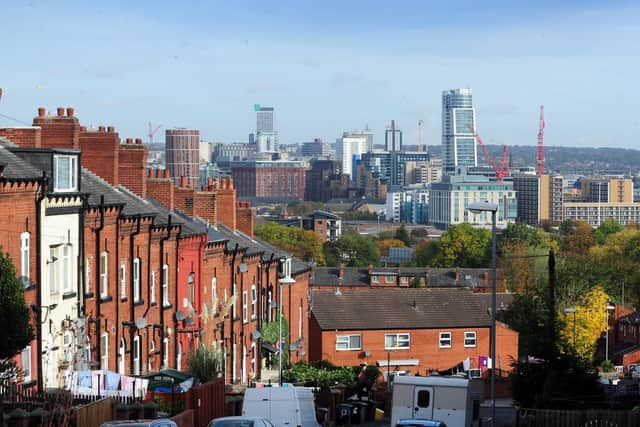Leeds Climate Commission roadmap shows carbon neutral city could save £651m per year and create 1,500 jobs
and live on Freeview channel 276
Compiled by Leeds Climate Commission, A Net-Zero Carbon Roadmap for Leeds says that action on the issue would also create 1,500 jobs for the next decade.
It argues that these social and economic benefits could be a central part of the city’s post-Covid recovery plans.
Advertisement
Hide AdAdvertisement
Hide Ad

The report also shows how the city can achieve its ambition of net-zero emissions by 2030, delivering many positive benefits for health, equality, travel, housing and the environment.
Writing in the preface of the report, commission chairperson Andy Gouldson and vice chairperson Coun Lisa Mulherin say: “The world has changed in 2020 with the coronavirus pandemic. From a climate perspective, it triggered some changes in our behaviour that could help us in the longer term – but we clearly need a more positive way of addressing the climate challenge in the context of a healthy, inclusive and vibrant city.
“This roadmap shows how, in the years to come, Leeds can radically reduce its carbon footprint whilst also becoming a better place, with cleaner air, improved public health, reduced poverty and inequality, increased employment and enhanced prosperity.
"The opportunities to stimulate the development of the city through climate action clearly highlight the need for a green recovery plan with investment in the decarbonisation of our homes, our businesses and our transport systems at its heart.”
Advertisement
Hide AdAdvertisement
Hide AdLeeds City Council passed a climate emergency motion in 2019, which included working to make Leeds carbon neutral by 2030. It is among the most ambitious climate targets in the UK and 20 years ahead of the national target of net-zero by 2050.
Founded in 2017, the Leeds commission is an independent body including representatives from 24 key businesses and organisations. Its task is to monitor progress on reaching the city's targets, encourage collaboration on projects that will make a measurable contribution and promote best practice.
Its new report updates its earlier publications with refreshed data, showing a more optimistic outlook as some low carbon options have already become cheaper and better.
Looking at the direct carbon emissions from all fuel and electricity use in the city, it says Leeds will have used up its entire share of the global carbon budget up to 2050 in just nine years’ time if it continues to emit the greenhouse gas at current rates.
Advertisement
Hide AdAdvertisement
Hide AdBut the analysis shows that Leeds could close the gap between its projected emissions in 2030 and its goal for net-zero emissions by 41 per cent purely through the adoption of cost-effective options in houses, public and commercial buildings, transport and industry.
It says such steps would reduce Leeds’ total projected energy bill in 2030 by £651m while also creating 14,623 years of employment in the city. They could also help to generate wider benefits, including helping to tackle fuel poverty, reducing congestion and productivity losses, improving air quality, and enhancements to public health.
"The most carbon-effective options for the city to deliver these carbon cuts include improved deep retrofitting of heating, lighting and insulation in houses, cooling and insulation in offices, shops and restaurants, and a range of measures across the transport sector including a shift to non-motorised transport and the wider up-take of electric vehicles," it says.
It looks at what other already available options could be adopted to close the gap by 60 per cent, although some of those would not pay for themselves directly through energy savings.
Advertisement
Hide AdAdvertisement
Hide AdIt also calculates the impact of acting on the recommendations of the Leeds Climate Change Citizens’ Jury, which would reduce the gap by a further 10 per cent.
Finally, the report examines a range of innovative interventions, including hydrogen-based heating, zero-carbon heavy goods transport and massive reforestation programmes that could deliver the remaining shortfall in emissions cuts to make the 2030 target a reality.
A separate report is planned into addressing the impact of indirect emissions that relate to the wider carbon footprint of residents’ consumption of goods and services, such as flights from Leeds Bradford Airport.
The commission is also preparing a series of policy documents and an investment prospectus – with an emphasis on community-based as well as institutional investment – to stimulate low carbon investments across the city.
Advertisement
Hide AdAdvertisement
Hide AdSupport the YEP and become a subscriber today. Enjoy unlimited access to local news and the latest on Leeds United, With a digital subscription, you see fewer ads, enjoy faster load times, and get access to exclusive newsletters and content. Click here to subscribe.
